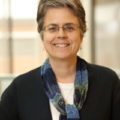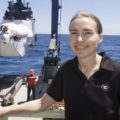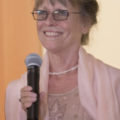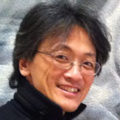2018 a2ru National Conference
Theme
The 2018 theme, Arts Environments: Design, Resilience, and Sustainability, is an invitation to explore the relationship between creativity and diverse cultural locations, by framing discussions about design, resilience, and sustainability in context of interdisciplinary artistic and environmental practice. The theme offers an opportunity to think broadly about the ecology of the arts and their environments, in terms of performance, design, and engineering.
Featured Speakers


Nicholas Allen is Director of the Willson Center for Humanities and Arts and Franklin Professor of English at the University of Georgia. He has published several books on Ireland and its literature, has been the Burns Visiting Scholar at Boston College, and has received many grants and awards, including from the Mellon Foundation, the National Endowment for the Humanities and the Irish Research Council.


Cassandra Fraser is a Professor of Chemistry at the University of Virginia, with joint appointments in Biomedical Engineering and the School of Architecture. She specializes in responsive materials for imaging, sensing and detection, specifically oxygen sensing biomaterials, mechanochromic luminescence materials and polymeric metal complexes. Fraser holds degrees from Kalamazoo College (BA 1984, Interdisciplinary: Political Theory, Theology, Philosophy, Women’s Studies), Harvard Divinity School (MTS 1988, Religion and Culture) and The University of Chicago (PhD 1993, Chemistry; advisor: Brice Bosnich). She was an NIH postdoctoral fellow with Robert Grubbs, 2005 Nobel Laureate in Chemistry, at the California Institute of Technology (1993-5). At UVA, she was awarded a Presidential Early Career Award for Scientists and Engineers, an NSF CAREER Award, an Alfred P. Sloan Research Fellowship, and young professor awards from Dupont and 3M. She has been recognized with a Radcliffe Fellowship (2006-7), an ACS Green Chemistry Institute Sabbatical Fellowship (2006-7), a Japanese Society for the Promotion of Science (JSPS) Fellowship (2012), a Rockefeller Foundation Bellagio Residency (2013), and a Humboldt Connect Grant (2013). Fraser has led many innovative interdisciplinary programs at UVA including Color: Across the Spectrum, Science Careers and Society Forum, Biomaterials Workshop, Designing Matter Common Course, Metals in Medicine and the Environment, the Plastic Project, and Transduction. Her teaching and mentoring accolades include the Cavaliers Distinguished Teaching Professorship, Alumni Distinguished Professor Award, Jefferson Scholar Foundation Teaching Award, and induction into the University Academy of Teaching. She has engaged in numerous creative projects with artists, designers, poets, composers and dancers. She was selected as Scientist in Residence at the School of the Art Institute of Chicago for Spring 2019. She has served on editorial advisory boards for Macromolecules and ACS Applied Materials and Interfaces and Materials Chemistry Frontiers. In 2004 she was named a National Associate of the National Academies, a lifetime appointment for service to the nation. In 2015, she was elected a Fellow of the American Association for the Advancement of Science (AAAS).


Samantha Joye is Athletic Association Professor in Arts and Sciences in the Department of Marine Sciences at the University of Georgia. Joye’s research examines the complex feedbacks that drive elemental cycling in coastal and open ocean environments, and the effects of climate change and anthropogenic disturbances on critical environmental processes to gain a better understanding of how future changes will affect ecosystem functioning. Her work in deep sea extreme environments explores how microbial processes interact with geological and physical processes.


Emil J. Kang is program director for Arts and Culture at The Andrew W. Mellon Foundation where he leads the grantmaking program nurturing exceptional creative accomplishment, scholarship, and conservation practices while advancing a diverse and sustainable ecosystem for the arts. Previously, Mr. Kang served as founding Executive and Artistic Director of Carolina Performing Arts, a major multi-disciplinary performing arts program at The University of North Carolina at Chapel Hill, where he also served as professor of the practice of music and special assistant to the chancellor for the arts. Mr. Kang serves as a member of the National Council on the Arts, having been appointed by former United States President Barack Obama in 2012


R. Benjamin Knapp is the Dean of Northeastern University’s College of Arts, Media, and Design. Previously, he was the Founding Executive Director of the Institute for Creativity, Arts, and Technology (ICAT) and Professor of Computer Science at Virginia Tech. ICAT seeks to promote research and education at the boundaries between art, design, engineering, and science.
For more than 20 years, Dr. Knapp has been working to create meaningful links between human-computer interaction, universal design, and various forms of creativity. His research on human-computer interaction has focused on the development and design of user-interfaces and software that allow both composers and performers to augment the physical control of a musical instrument with direct sensory interaction. He holds twelve patents and is the co-inventor of the BioMuse system, which enables artists to use gesture, cognition, and emotional state to interact with audio and video media.
In previous positions, Dr. Knapp has served as a Fulbright Senior Specialist at University College, Dublin, and chief technology officer of the Technology Research for Independent Living Centre. As the director of technology at MOTO Development Group in San Francisco, Calif., he managed teams of engineers and designers developing human-computer interaction systems for companies such as Sony, Microsoft, and Logitech. He co-founded BioControl Systems, a company that develops mobile bioelectric measurement devices for artistic interaction. Dr. Knapp has also served as professor and chair of the Department of Computer, Information, and Systems Engineering at San Jose State University.
He earned a doctorate and master’s degrees in electrical engineering from Stanford University and a bachelor’s degree in electrical engineering from North Carolina State University. Dr. Knapp has been a PI in several pan-European projects including, CAPSIL (Common Awareness and Knowledge Platform for Studying and Enabling Independent Living) and SIEMPRE (Social Interaction and Entrainment Using Music Performance) and coordinated the EU project, BRAID (Bridging Research in Ageing and ICT Development).


Peter Linett is chairman & chief idea officer of Slover Linett Audience Research, a social research firm for the cultural sector. He and his colleagues help arts organizations, museums of all types, science communicators, and cultural funders and agencies understand their communities, evaluate their impact, and experiment with new strategies for engagement. Linett has worked with Carnegie Hall, the Metropolitan Museum of Art, the American Museum of Natural History, Goodman Theatre, Folk Alliance International, Chicago Public Radio, the National Academy of Sciences, Cornell University, the MacArthur Foundation, and the John S. & James L. Knight Foundation, among many other cultural and community innovators. He serves on the editorial board of Curator, the museum field’s leading peer-reviewed journal, and was previously the journal’s associate editor for theory and practice. He co-organized the Evolving Culture of Science Engagement initiative, which began in 2013 with a convening of game-changing science communicators at MIT. Linett was an associate of the Cultural Policy Center at the University of Chicago from 2008 to 2014, and has spoken at conferences and symposia in the US and UK. He serves on the advisory board of Guerilla Science. Linett lives in Santa Fe and Chicago.


Invested as the first Marilyn Stokstad Director of the Spencer Museum of Art, Saralyn Reece Hardy has led the only comprehensive art museum in Kansas since 2005. Prior to her arrival at the Spencer, Reece Hardy served as director of Museums and Visual Arts at the National Endowment for the Arts (NEA) and as director of the Salina Art Center in Salina, Kansas. Reece Hardy led the Spencer Museum’s Phase I multi-year renovation project, which transformed the Museum’s galleries; introduced a multi-use object study room; and expanded teaching, research, and storage facilities. Her recent projects include the Integrated Arts Research Initiative, an interdisciplinary effort funded by the Andrew W. Mellon Foundation; Art in the Grove, an initiative to enliven the historic green space on KU’s Lawrence campus with art; leading the University of Kansas Art on Campus Committee on the Lawrence campus; and facilitating ongoing commissions with the University of Kansas campus partners in Kansas City, Lawrence, and Salina. She participates in the development of the International Artist-in-Residence program and is conducting interviews about aging and legacy with artists represented in the Museum’s permanent collection which are 70 years old or older. Reece Hardy has led the Spencer Museum in two integral partnerships: one with the Kansas City–based Charlotte Street Foundation on the Rocket Grants program, funded by the Andy Warhol Foundation for the Visual Arts, and one with the KU Biodiversity Institute and the KU Hall Center for the Humanities to form The Commons, a physical and intellectual space for interdisciplinary exploration.


Garth Ross is the inaugural executive director of the Schwarzman Center at Yale University. Prior to his work at Yale, Ross served as vice president of community engagement at The Kennedy Center in Washington, DC. He has over 20 years’ experience developing and executing strategies for enlarging constituencies and increasing participation in the arts. Through this work, he has produced over 7,000 performances in a wide range of genres, featuring artists from all 50 states and around the world.
Ross established The Kennedy Center’s Millennium Stage daily free performance series, as well as many other notable projects and festivals including Joyful Sounds: Gospel Across America, Look Both Ways: Street Arts Across America, American Voices with Renée Fleming, One Mic: Hip-Hop Culture Worldwide and Finding a Line: Skateboarding, Music and Media. With a focus on cultivating unique collaborations between organizations, artists, communities and disciplines, his work illuminates the possibility of compatibility between different cultural viewpoints by including diverse stakeholders in the process of cultural production.
His chapter entitled, “From Fight club to The Kennedy Center: How We Learned to Cross Invisible Bridges,” was published in the book Grassroots Leadership and the Arts for Social Change (2017 Emerald Publishing Limited). Ross received his BA in English Literature and Music from Connecticut College and is a Henry Crown Fellow of the Aspen Institute.


Rebecca Rutstein – whose work spans painting, interactive sculpture and public art – is a visual artist who explores abstraction inspired by geology, microbiology and marine science. Rutstein has completed art residencies around the world, both on land, and at sea aboard research ships, collaborating with scientists through fellowships from Ocean Exploration Trust, Schmidt Ocean Institute and the National Academies of Sciences – Keck Futures Initiative. Through NSF funding, she is slated to make her first descents to the ocean floor in the deep-sea submersible, Alvin, in October & November 2018, with science teams from Temple University and University of Georgia. She has been selected as University of Georgia’s 2018-19 Delta Visiting Chair for Global Understanding with a yearlong solo exhibition at the Georgia Museum of Art. Her work has been featured on NPR and in the Wall Street Journal, Huffington Post and Vice Magazine. With over twenty-five solo exhibitions, Rutstein has exhibited widely in museums and institutions and has received numerous awards including a Pew Fellowship in the Arts, an Independence Foundation Fellowship and a Pennsylvania Council on the Arts Grant. Her work can be found in public collections including the Philadelphia Museum of Art, Pennsylvania Academy of the Fine Arts, Johns Hopkins Hospital, Albert Einstein College of Medicine and Temple University. Rutstein holds a BFA (Magna Cum Laude) from Cornell University, with abroad study in Rome, Italy, and an MFA from University of Pennsylvania. She has been a visiting artist at museums and universities across the U.S. and enjoys speaking about the intersection of art and science.


Dr. Paul Shrivastava, is Chief Sustainability Officer of Penn State University. He is also Director of Sustainability Institute, and Professor of Management at the Smeal College of Business. Prior to this he served as the first Executive Director of Future Earth global research platform.
Paul is an academic entrepreneur. He was part of the team that founded Hindustan Computer Ltd., one of India’s largest computer companies. He founded the non-profit Industrial Crisis Institute, Inc. New York. He founded the journal Organization and Environment, (published by Sage Publications). He was founding President and CEO of eSocrates, Inc., a knowledge management software company, and the founding Chair of the Organizations and the Natural Environment Division of the Academy of Management.
Paul’s research uses science and arts to develop transdisciplinary solutions to sustainability challenges. His current focus is on implementation of Sustainable Development Goals. He is working with colleagues at Penn State, at Future Earth and at the United Nations to develop programs for implementing SDGs, and monitoring and measuring their progress. He believes that infusing sustainability across research, teaching, community and student engagement at Penn State University’s 23 campuses can help us implement sustainability across the Commonwealth of Pennsylvania.
Paul received his Ph. D. from the University of Pittsburgh. He has published 17 books and over 100 articles in refereed and scholarly journals. He has served on the editorial boards of numerous leading management education journals. His work was recognized with a Fulbright Senior Scholar Award and IIM Calcutta Distinguished Alumni Award.


Sha Xin Wei is Professor and Director of the School of Arts, Media + Engineering at ASU. He directs the Synthesis Center for responsive environments and improvisation with colleagues in AME and affiliate research centers.
From 2005-2013 Dr. Sha was the Canada Research Chair in media arts and sciences, and Associate Professor of Fine Arts at Concordia University in Montréal, Canada. From 2001 to 2013 he directed the Topological Media Lab, an atelier-laboratory for the study of gesture and materiality from computational and phenomenological perspectives. He
established the TML at Georgia Institute of Technology in 2001, and moved the lab to Montréal in 2005 with the support of the Canada Fund for Innovation and the CRC.
Dr. Sha’s research concerns ethico-aesthetic improvisation, and a topological approach to morphogenesis and process philosophy. His particular areas of study include the realtime, continuous mapping of features extracted from gestural instruments (such as woven or non-woven fabrics) into parameters modulating the continuous synthesis of video, sound, and physical or software control systems. This technical work supports the expressive improvisation of gesture in dense, palpable fields of sound, video and structured light, and animated materials.
Sha’s art research includes the TGarden responsive environments (Ars Electronica, Dutch Electronic Art Festival, MediaTerra Athens, SIGGRAPH), Hubbub speech-sensitive urban surfaces, Membrane calligraphic video, Softwear gestural sound instruments, the WYSIWYG gesture-sensitive sounding weaving, Ouija performance-installations, Cosmicomics Elektra, eSea Shanghai and the IL Y A video membrane, and Einsteins Dreams time-conditioning instruments. Sha collaborated with choreographer Michael Montanaro and the Blue Riders ensemble to create a stage work inspired by Shelley’s Frankenstein, with experimental musicians, dancers and responsive media.
Sha co-founded the Sponge art group in San Francisco to build public experiments in phenomenology of performance. With Sponge and other artists, Sha has directed event/installations in prominent experimental art venues including Ars Electronica Austria, DEAF / V2 The Netherlands, MediaTerra Greece, Banff Canada, Future Physical United Kingdom, Elektra Montréal, and eArts Shanghai. He has also exhibited media installations at Postmasters Gallery New York and Suntrust Gallery Atlanta. These works have been recognized by awards from major cultural foundations such as the Daniel Langlois Foundation for Art, Science and Technology; the LEF Foundation; the Canada Fund for Innovation; the Creative Work Fund in New York; Future Physical UK; and the Rockefeller Foundation.
Sha Xin Wei was trained in mathematics at Harvard and Stanford Universities, and worked more than 12 years in the fields of scientific computation, mathematical modeling and the visualization of scientific data and geometric structures.
In 1995, he extended his work to network media authoring systems and media theory coordinating a 3 year long workshop on interaction and computational media at Stanford. In 1997, he co-founded Pliant Research with colleagues from Xerox PARC and Apple Research Labs, dedicated to designing technologies that people and organizations can robustly reshape to meet evolving socio-economic needs.
MIT Press has recently published Dr. Sha’s book, Poiesis, Enchantment, and Topological Matter.
Host
A land and sea grant institution inextricable from the town of Athens and the broader ecologies of Georgia and the Southeast, the University of Georgia will provide a rich context for thinking creatively about Arts Environments globally.
Special Events
Moogfest
Saturday, November 3, 2018, 8pm
Georgia Theatre
Moogfest is the synthesis of music, art, and technology. Since 2004, Moogfest has brought together artists, futurists, inventors, entrepreneurs, designers, scientists, and musicians. Moogfest has been a tribute to synthesizer legend Dr. Robert Moog and the profound influence his inventions have had on how we hear the world. Over the last sixty years, Bob Moog and Moog Music have pioneered the analog synthesizer and other technology tools for artists.
University of Georgia Spotlight on the Arts
The UGA Spotlight on the Arts Festival is an annual multi-day event highlighting units and facilities, from visual arts and creative writing to music, dramatic arts, dance, and more. The 2018 Spotlight on the Arts festival is scheduled for November 1-11, 2018.
Featured Spotlight on the Arts Events
Student Spotlight
Thursday, November 1, 2018, 10am-4pm
Tate Plaza
An all-day event featuring performances from student organizations and individuals displaying their talents in music, theater, dance, and creative writing.
Kaleidoscope: Spotlight on the Arts Opening Celebration
Thursday, November 1, 7:30pm
Performing Arts Center
To kick off the Spotlight on the Arts festival, UGA’s arts programs present an hour-long kaleidoscope of student performances and presentations. This brilliant, non-stop collage of the arts provides a window into the vast scope of the creative work on campus, from dance to music, theater, creative writing and art. The event is free and open to the public. Sponsored by the UGA Arts Council.
Atlanta Symphony Orchestra Concert: Mahler Symphony No. 10
Donald Runnicles, conductor
Friday, November 2, 2018, 8:00pm; pre-performance talk in Ramsey Concert Hall at 7:15pm
Performing Arts Center, Hugh Hodgson Concert Hall
When Gustav Mahler died, only his widow knew of the enigmatic Tenth Symphony. He left his final opus only partially orchestrated, but its tragic melodies, its shape, and substance were all on paper waiting to be snatched from the grave. This season Athens audiences can hear Mahler’s magnificent swan song masterfully realized by the British musician, scholar, and broadcaster Deryck Cooke. ASO Principal Guest Conductor Donald Runnicles directs the powerful program.
* * * * * *
Rebecca Rutstein Exhibition
Georgia Museum of Art
Lamar Dodd School of Art
Rebecca Rutstein is an artist whose work spans painting, sculpture, installation, and public art and explores abstraction inspired by science, data and maps. She has exhibited widely in museums, institutions and galleries, and has received numerous awards including the prestigious Pew Fellowship in the Arts. Rutstein will be visiting UGA as the Delta Visiting Chair for Global Understanding during the conference and also in spring of 2019.
Samantha Joye is Athletic Association Professor in Arts and Sciences in the Department of Marine Sciences at the University of Georgia. Joye’s research examines the complex feedbacks that drive elemental cycling in coastal and open ocean environments, and the effects of climate change and anthropogenic disturbances on critical environmental processes to gain a better understanding of how future changes will affect ecosystem functioning. Her work in deep sea extreme environments explores how microbial processes interact with geological and physical processes.
Rutstein will create a sixty-four-foot-long interactive sculptural installation with laser cut steel and LED lights, and a monumental four-part painting installation at the Georgia Museum of Art to be featured during the a2ru conference. She will also exhibit a mural sized banner at the Lamar Dodd School of Art. Rutstein’s work will reflect Joye’s previous expedition to the Guaymas Basin, shedding light on the unique processes occurring at this unusual hydrothermal vent location. Joye and Rutstein will go on an ocean expedition together to Guaymas Basin following the conference, including a dive in the deep-sea submersible, Alvin, and will follow-up about their joint experiences at UGA in the spring of 2019. They will participate in a conversation as part of the conference agenda on Friday morning.
* * * * * *
Broderick Flanigan Mural with UGA Art Students – Community Partnership
Broderick Flanigan and UGA art students will be creating a mural aligned with the theme of the conference in the atrium of the Georgia Center for Continuing Education & Hotel. Flanigan was born and raised in Athens, Georgia and is owner of Flanigan’s Portrait Studio established in 2013. Specializing in painting and drawing, he enjoys inspiring others through art! Follow him on Facebook and Instagram @Flanigansportraitstudio.
